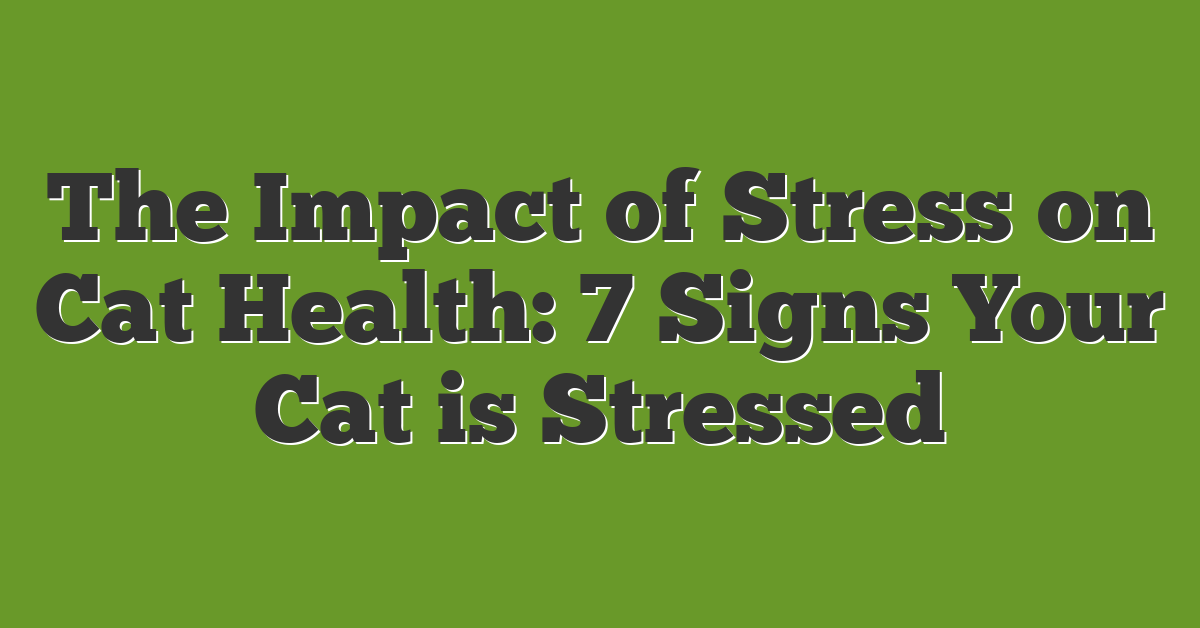Living with a cat is a joy, but you might not realize how stress can impact their health. Just like us, your feline friend can feel uneasy from changes in their environment or daily routine.

When your cat is stressed, it can lead to various health issues, from digestive problems to a weakened immune system. By understanding the signs of stress and creating a calming environment, you can help keep your cat happy and healthy.
Discover how stress affects your cat and learn simple steps to ensure your furry companion thrives.
Understanding Cat Stress
Stress affects your cat’s health and happiness. Recognizing stressors and signs helps you keep your cat calm.
Common Stressors in Cats
- Changes in Environment: Moving to a new home or rearranging furniture can unsettle your cat.
- Loud Noises: Fireworks, thunderstorms, or loud music may scare your cat.
- New Pets or People: Introducing a new animal or person can make your cat anxious.
- Lack of Routine: Irregular feeding or playtimes can stress your cat.
- Health Issues: Illness or pain can increase your cat’s stress levels.
Recognizing Signs of Stress
- Hiding: Your cat stays in secluded spots more often.
- Changes in Appetite: Eating less or more than usual.
- Excessive Grooming: Overlicking fur or paws, sometimes leading to bald spots.
- Aggression: Increased biting or scratching.
- Litter Box Problems: Urinating or defecating outside the box.
Physical Health Impacts
Stress affects your cat’s physical health in several ways. It can weaken their immune system and cause digestive issues.
Immune System Suppression
When your cat is stressed, their immune system weakens. This makes them more vulnerable to infections like upper respiratory infections and feline herpesvirus. Studies show that stressed cats have lower levels of antibodies, reducing their ability to fight off diseases. You might notice your cat getting sick more often or taking longer to recover from illnesses.
Digestive Issues
Stress disrupts your cat’s digestive system. It can lead to problems like diarrhea, vomiting, or constipation. Cats under stress may also experience decreased appetite or sudden increased hunger. These digestive issues cause discomfort and further weaken your cat’s overall health. Ensuring a stable environment helps maintain your cat’s digestive health.
Behavioral Changes Due to Stress
Stress affects your cat’s behavior in noticeable ways. You might observe changes that signal your cat is feeling uneasy.
Altered Eating Patterns
Cats under stress may eat less or overeat. Reduced appetite leads to weight loss and weak immunity. Overeating can cause obesity and digestive issues. Monitor your cat’s food intake and consult your vet if changes persist.
Increased Aggression
A stressed cat might show aggression towards people or other pets. Signs include hissing, scratching, or biting. Aggression stems from fear or frustration. Providing a calm environment helps reduce these behaviors.
Managing and Mitigating Stress
Helping your cat manage stress keeps them healthy and happy. Use these strategies to reduce stress in your cat’s life.
Environmental Enrichment
Create a stimulating environment to engage your cat.
- Toys: Offer various toys like feather wands, laser pointers, and puzzle feeders.
- Scratching Posts: Provide multiple scratching posts to satisfy natural scratching behavior.
- Perches and Shelves: Install cat trees or shelves for climbing and observing their surroundings.
- Hiding Spots: Set up safe spaces with boxes or cat condos for your cat to retreat.
- Routine: Maintain consistent feeding and playtimes to create a predictable schedule.
Veterinary Interventions
Seek professional help to address your cat’s stress.
- Health Checkups: Regular exams ensure no medical issues contribute to stress.
- Behavioral Therapy: Vets can suggest behavior modification techniques to reduce anxiety.
- Medications: In severe cases, medication may help manage your cat’s stress.
- Nutritional Support: A balanced diet supports overall health and minimizes stress-related problems.
Conclusion
Watching your cat navigate stress is tough but understanding its impact helps you support their health. By staying alert to their behaviors and creating a calm environment you’re making a big difference. Simple changes like maintaining routines and providing enriching spaces can boost their well-being. Don’t hesitate to reach out to your vet if you notice persistent signs. Your efforts ensure your feline friend stays happy and healthy. Together you can help them thrive even when life gets a little hectic.










